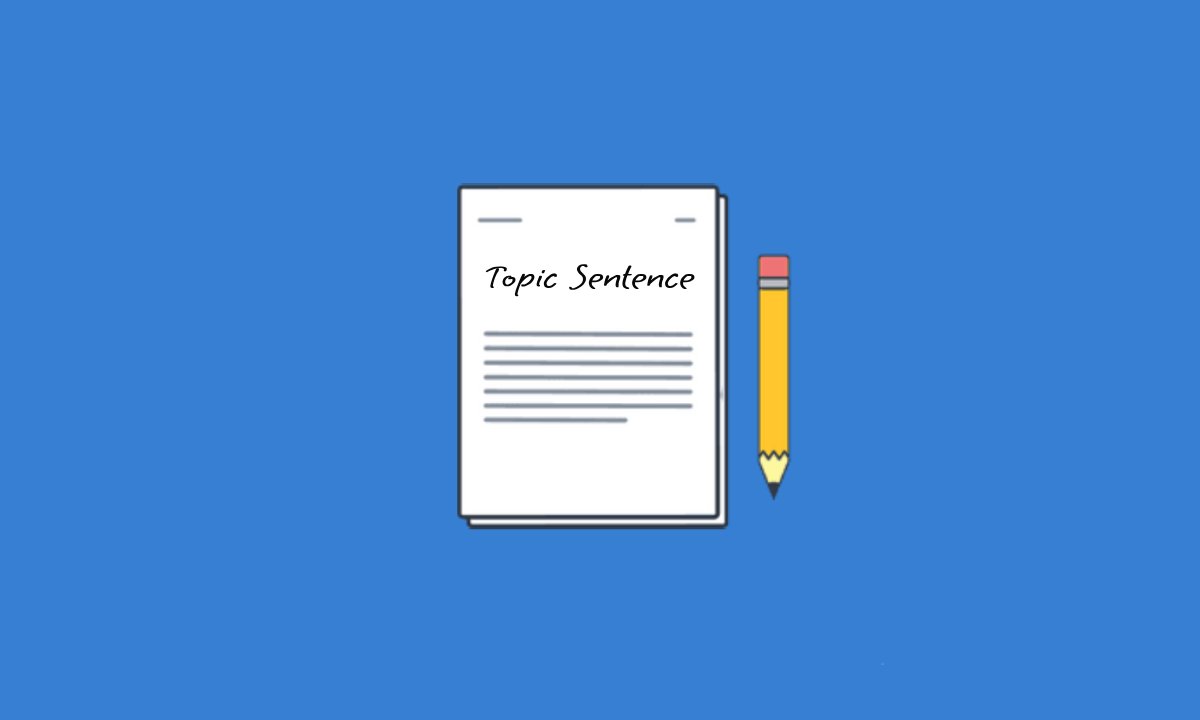What is Topic Sentence?
A topic sentence is a sentence that expresses the main idea of a paragraph. It typically appears at the beginning of the paragraph, setting the stage for the sentences that follow. The purpose of a topic sentence is to provide a clear and concise summary of the paragraph’s content, guiding the reader through the argument or information being presented.
How to Write a Topic Sentence?
Below are steps and tips to make an effective topic sentence:
Determine the Main Idea:
Identify the central point or argument of your paragraph. Ask yourself what you want to convey in this particular section.
Be Specific:
Make sure your topic sentence is specific enough to cover the scope of the paragraph but not so detailed that it leaves nothing for the rest of the paragraph to explain.
Keep It Clear and Concise:
Use straightforward language. Avoid jargon and overly complex words.
Include Keywords:
Use words and phrases that are relevant to your topic and that will be repeated or expanded upon in the paragraph.
Position It Well:
Typically, the topic sentence is the first sentence of a paragraph, but it can also be placed at the end or even in the middle for stylistic reasons or to create suspense.
Tips for Writing a Good Topic Sentence
Make It Interesting:
Engage your reader from the start. Use a hook if appropriate to capture attention.
Relate to the Thesis:
Ensure that your topic sentence supports your essay’s thesis statement. It should contribute to the overall argument or narrative of your writing.
Avoid Announcements:
Instead of saying, “In this paragraph, I will discuss…”, get straight to the point: “The industrial revolution significantly transformed urban living conditions.”
Use Transition Words:
If your paragraph is part of a larger piece, use transitional phrases to link it to previous paragraphs: “Furthermore,” “In addition,” “However,” etc.
Topic Sentence Examples:
Below are some examples of topic sentences:
Essay
- The rise of social media has significantly altered the way we communicate and interact with each other.
- Climate change poses a severe threat to the planet, necessitating immediate and concerted global action.
- Education is a powerful tool that can break the cycle of poverty and empower individuals to achieve their full potential.
- The evolution of technology has revolutionized industries, from healthcare to transportation, enhancing efficiency and accessibility.
- The importance of mental health awareness cannot be overstated, as it impacts every aspect of a person’s life.
Paragraph
- The serene beauty of the national park attracts thousands of visitors every year, providing a perfect escape from the hustle and bustle of city life.
- Despite its challenges, remote work offers numerous benefits, including increased flexibility and reduced commuting time.
- The vibrant culture and rich history of New Orleans make it a unique and fascinating destination for travelers.
- Regular exercise plays a crucial role in maintaining physical health and preventing chronic diseases.
- The benefits of learning a second language extend beyond communication, fostering cognitive development and cultural appreciation.
Argumentative Essay
- School uniforms should be mandatory in public schools to promote equality and reduce distractions.
- The death penalty should be abolished as it is inhumane and fails to deter crime effectively.
- Animal testing for cosmetics should be banned to protect the rights and well-being of animals.
- Climate change legislation is essential to mitigate the catastrophic effects of global warming on future generations.
- Social media platforms should be regulated to prevent the spread of misinformation and protect user privacy.
Biographies
- Nelson Mandela’s life is a testament to the power of resilience and the fight for justice.
- Marie Curie’s groundbreaking research in radioactivity changed the course of science and earned her two Nobel Prizes.
- Mahatma Gandhi’s philosophy of nonviolence and civil disobedience inspired movements for civil rights and freedom across the world.
- Amelia Earhart’s pioneering spirit and achievements in aviation made her a symbol of courage and determination.
- The artistic genius of Leonardo da Vinci is reflected in his diverse contributions to art, science, and engineering.
Informative Essay
- Renewable energy sources, such as solar and wind power, offer sustainable alternatives to fossil fuels.
- The human digestive system is a complex network that efficiently processes food and absorbs nutrients.
- Cybersecurity measures are crucial in protecting sensitive information from unauthorized access and cyber threats.
- The history of the internet traces back to early research in networking technologies and has revolutionized global communication.
- The process of photosynthesis is fundamental to life on Earth, enabling plants to convert sunlight into energy.
Book Reports
- Harper Lee’s “To Kill a Mockingbird” explores themes of racial injustice and moral growth in the American South.
- In “1984,” George Orwell presents a dystopian future where totalitarianism suppresses individual freedom and truth.
- “Pride and Prejudice” by Jane Austen delves into the complexities of social class, marriage, and personal development.
- J.K. Rowling’s “Harry Potter and the Sorcerer’s Stone” introduces readers to a magical world filled with adventure and friendship.
- “The Great Gatsby” by F. Scott Fitzgerald examines the American Dream and the moral decay of society in the 1920s.
Difference Between Topic Sentence and Thesis Statement:
Below are some key differences between a topic sentence and a thesis statement:
- The topic sentence covers the specific content of a single paragraph; the thesis statement encompasses the overall theme or argument of the entire essay.
- The topic sentence is typically the first sentence of a paragraph; the thesis statement is usually placed at the end of the introductory paragraph.
- The topic sentence is more specific and focuses on a single point within a paragraph; the thesis statement is broader and outlines the main argument of the essay.
- The topic sentence directly relates to the content of its paragraph and ties back to the thesis; the thesis statement sets the direction for all the content in the essay.
- The topic sentence is developed through the details and examples within its paragraph; the thesis statement is developed through the combined arguments and evidence presented in all the paragraphs.
- These distinctions help to clarify the different roles that topic sentences and thesis statements play in organizing and articulating the arguments and ideas within an essay.



